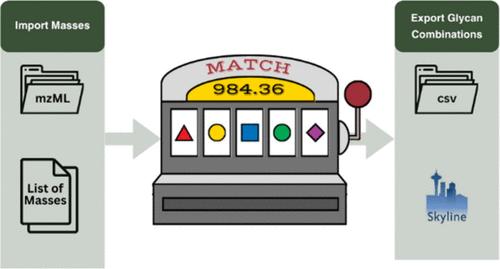GlyCombo Enables Rapid, Complete Glycan Composition Identification across Diverse Glycomic Sample Types
IF 3.1
2区 化学
Q2 BIOCHEMICAL RESEARCH METHODS
Journal of the American Society for Mass Spectrometry
Pub Date : 2024-09-13
DOI:10.1021/jasms.4c00188
引用次数: 0
Abstract
Glycans are sugar-based polymers found to modify biomolecules, including lipids and proteins, as well as occur unconjugated as free polysaccharides. Due to their ubiquitous cellular presentation, glycans mediate crucial biological processes and are frequently sought after as biomarkers for a wide range of diseases. Identification of glycans present in samples acquired with mass spectrometry (MS) is a cornerstone of glycomics research; thus, the ability to rapidly identify glycans in each acquisition is integral to glycomics analysis pipelines. Here we introduce GlyCombo (https://github.com/Protea-Glycosciences/GlyCombo), an open-source, freely available software tool designed to rapidly assign monosaccharide combinations to glycan precursor masses including those subjected to MS2 in LC-MS/MS experiments. GlyCombo was evaluated across six diverse data sets, demonstrating MS vendor, derivatization, and glycan-type neutrality. Compositional assignments using GlyCombo are shown to be faster than the current predominant approach, GlycoMod, a closed-source web application. Two unique features of GlyCombo, multiple adduct search and off-by-one error anticipation, reduced unassigned MS2 scans in a benchmark data set by 40%. Finally, the comprehensiveness of glycan feature identification is exhibited in Skyline, a software that requires predefined transitions that are derived from GlyCombo output files.

GlyCombo 可快速、完整地鉴定各种类型的聚糖样品中的聚糖成分
聚糖是以糖为基础的聚合物,可修饰生物大分子,包括脂质和蛋白质,也可作为游离多糖出现。由于其在细胞中无处不在,聚糖介导着重要的生物过程,并经常被用作各种疾病的生物标记物。鉴定质谱(MS)采集样本中的聚糖是糖组学研究的基石;因此,在每次采集中快速鉴定聚糖的能力是糖组学分析管道不可或缺的一部分。我们在此介绍 GlyCombo (https://github.com/Protea-Glycosciences/GlyCombo),这是一款开源、免费的软件工具,旨在快速将单糖组合分配给糖前体质量,包括在 LC-MS/MS 实验中进行 MS2 的糖前体质量。GlyCombo 通过六个不同的数据集进行了评估,证明了 MS 供应商、衍生化和聚糖类型的中立性。结果表明,使用 GlyCombo 进行成分分配比目前最主要的方法 GlycoMod(一种闭源网络应用程序)更快。GlyCombo 的两个独特功能,即多重加合物搜索和逐一错误预测,将基准数据集中未分配的 MS2 扫描减少了 40%。最后,Skyline 软件展示了聚糖特征识别的全面性,该软件需要从 GlyCombo 输出文件中获得预定义的转换。
本文章由计算机程序翻译,如有差异,请以英文原文为准。
求助全文
约1分钟内获得全文
求助全文
来源期刊
CiteScore
5.50
自引率
9.40%
发文量
257
审稿时长
1 months
期刊介绍:
The Journal of the American Society for Mass Spectrometry presents research papers covering all aspects of mass spectrometry, incorporating coverage of fields of scientific inquiry in which mass spectrometry can play a role.
Comprehensive in scope, the journal publishes papers on both fundamentals and applications of mass spectrometry. Fundamental subjects include instrumentation principles, design, and demonstration, structures and chemical properties of gas-phase ions, studies of thermodynamic properties, ion spectroscopy, chemical kinetics, mechanisms of ionization, theories of ion fragmentation, cluster ions, and potential energy surfaces. In addition to full papers, the journal offers Communications, Application Notes, and Accounts and Perspectives

 求助内容:
求助内容: 应助结果提醒方式:
应助结果提醒方式:


